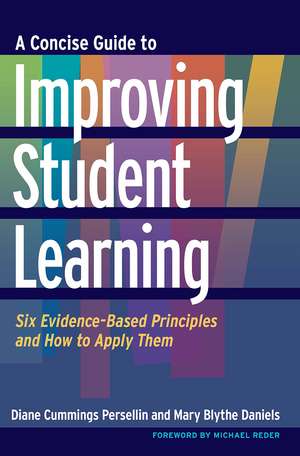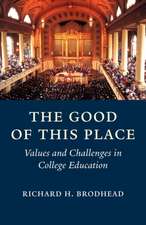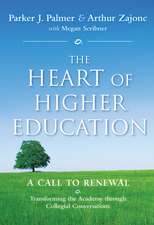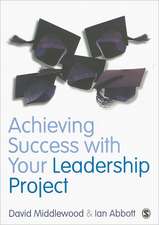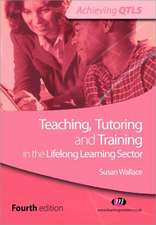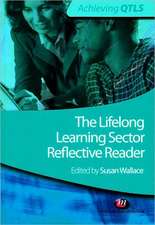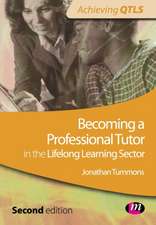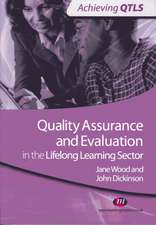A Concise Guide to Improving Student Learning: Six Evidence-Based Principles and How to Apply Them
Autor Diane Cummings Persellin, Mary Blythe Danielsen Limba Engleză Paperback – 16 iul 2014
| Toate formatele și edițiile | Preț | Express |
|---|---|---|
| Paperback (1) | 239.58 lei 6-8 săpt. | |
| Taylor & Francis – 16 iul 2014 | 239.58 lei 6-8 săpt. | |
| Hardback (1) | 995.85 lei 6-8 săpt. | |
| Taylor & Francis – 11 iul 2014 | 995.85 lei 6-8 săpt. |
Preț: 239.58 lei
Nou
Puncte Express: 359
Preț estimativ în valută:
45.85€ • 47.37$ • 38.14£
45.85€ • 47.37$ • 38.14£
Carte tipărită la comandă
Livrare economică 19 martie-02 aprilie
Preluare comenzi: 021 569.72.76
Specificații
ISBN-13: 9781620360927
ISBN-10: 1620360926
Pagini: 144
Dimensiuni: 152 x 229 x 13 mm
Greutate: 0.18 kg
Ediția:1
Editura: Taylor & Francis
Colecția Routledge
Locul publicării:Oxford, United Kingdom
ISBN-10: 1620360926
Pagini: 144
Dimensiuni: 152 x 229 x 13 mm
Greutate: 0.18 kg
Ediția:1
Editura: Taylor & Francis
Colecția Routledge
Locul publicării:Oxford, United Kingdom
Public țintă
Postgraduate and Professional Practice & DevelopmentCuprins
Foreword Preface Introduction. Knowing About Learning Informs Our Teaching 1 Deeper Learning and Better Retention Principle 1. Desirable Difficulties Increase Long-Term Retention Workshop 1.1. Concept Maps Principle 2. Meaningful and Spaced Repetition Increases Retention Principle 3. Emotion and Relevance Deepen Learning Workshop 3.1. Community-Based Learning 2 Actively Engaged Learning Principle 4. Multisensory Instruction Deepens Learning Workshop 4.1. The Flipped Classroom Principle 5. Small Groups Engage Students Workshop 5.1. Problem-Based Learning Workshop 5.2. Process-Oriented Guided-Inquiry Learning 3 Assessment Principle 6. Formative Assessment or Low-Stakes Evaluation Strengthens Retention Workshop 6.1. Grading, Summative Assessment, and High-Stakes Evaluation 6.1A. Creating Assessment Tools 6.1B. Constructing Rubrics 6.1C. Tips for Grading Papers and Essay Exams Workshop 6.2. Soliciting Midsemester Student Feedback to Improve a Course Appendix A. Course Design Workshops Workshop A.1. The Syllabus Workshop A.2. Strategies for the First and Last Days of Class Appendix B. Workshop on Lectures and Minilectures. Planning and Delivery Appendix C. Workshop on Classroom Discussions Bibliography Index
Notă biografică
Diane Cummings Persellin is Professor and Coordinator of Music Education at Trinity University in San Antonio, Texas. An author of over 100 articles and book chapters, her research interests focus on teacher preparation, professional development in higher education, and applications of research on learning. Currently, she is Director of the Trinity University Summer Program for Music Educators, a staff member of the Associated Colleges of the South Teaching and Learning Workshop, and on editorial boards of College Teaching and Texas Music Education Research. Most recently she helped develop Trinity’s new Collaborative for Learning and Teaching as its interim co-director. Dr. Persellin has served as Editor of General Music Today and as President of Texas Music Educators Conference and has presented numerous workshops and papers at national and international conferences including POD and Lilly. An award-winning teacher and advisor, she was inducted into the San Antonio Women's Hall of Fame for her work in education. Mary Blythe Daniels is Stodghill Professor of Spanish at Centre College. Dr. Daniels was named Centre College’s National Endowment for the Humanities Distinguished Professor and has also received the Kirk Award for Excellent Teaching. She has a strong background in literature, language instruction, and pedagogy in higher education. Her diverse research interests have led her to publish articles about seventeenth-century Spanish theater and about community-based learning. Daniels’ work in experiential and community-based learning has been presented on college campuses, at national conferences and has received significant external funding. Daniels is a staff member of the Associated Colleges of the South’s Teaching and Learning Workshop, and has presented at national and international conferences including POD and Lilly.
Recenzii
"A Concise Guide to Improving Student Learning: Six Evidence-Based Principles and How to Apply Them offers educators at the college teaching levels specific ideas on how to apply theory to learning, and pairs a research-based book with a guide to advancing scholarship quality in higher education. Chapters are intended for faculty who want to engage their students, but have little time to study the process. Recent research findings are thus summarized, linked to college classroom applications and methods, and contrasted with teaching methods that have been used less successfully. Add in annotated bibliographies and citations and you have a fine guide educators will relish."
California Bookwatch
“In just a few dozen pages, this research-based book will inspire and help you to make your teaching more intentional, engaging, and effective. This concise guide synthesizes recent scholarship to provide practical advice that is accessible to everyone who teaches in higher education.”
Peter Felten
Assistant Provost for Teaching and Learning, Director, Center for Engaged Learning, and Professor of History, Elon University
“You have in your hand, in one, compact package, a primer, a detailed guidebook to becoming a more effective teacher. In just sixty pages of main text you will find rich morsels, insights, and wisdom about approaches to improving student learning. Professors Persellin and Daniels have combed over and reviewed the best ideas about effective teaching and learning, straining them down to six, straightforward principles.
What does this book do that is different from the other books about teaching and learning? Those of us who have ventured into the literature on teaching and learning know that, over the past two decades, it has become a discipline unto itself. The options and resources for improving one’s teaching sometime feel limitless and overwhelming, especially for faculty members who are busily engaged not only in teaching and service, but also in research and creative work. A Concise Guide reviews, condenses, and explains those theories and practices—allowing you, the reader, to efficiently and effectively engage with those ideas.”
Michael Reder, Director
Joy Shechtman Mankoff Faculty Center for Teaching & Learning, Connecticut College
"This is a valuable guide for college and university teachers of all levels of experience because it bridges the gap between what we know about students’ learning and how we teach. The book culls important research to offer up a concise set of evidence-based strategies teachers can put to use immediately to enhance students’ academic success."
Mary-Ann Winkelmes, Coordinator of Instructional Development and Research
University of Nevada, Las Vegas
"This book achieves several important goals. First, it is indeed concise. This is a major service to teachers. The literature is large and continually growing, but the authors succeed in bringing it all together in a highly practical and accessible way. There are three chapters which not only provide theory, but also a wide range of approaches and examples for achieving deeper learning, using action centered pedagogy, and assessing the outcomes. It will be of great use to experts in the disciplines who are asked to teach, but have little or no knowledge of learning theory and teaching methods (which is most of us.)"
James Zull, Author, “The Art of Changing the Brain: Enriching the Practice of Teaching by Exploring the Biology of Learning”
California Bookwatch
“In just a few dozen pages, this research-based book will inspire and help you to make your teaching more intentional, engaging, and effective. This concise guide synthesizes recent scholarship to provide practical advice that is accessible to everyone who teaches in higher education.”
Peter Felten
Assistant Provost for Teaching and Learning, Director, Center for Engaged Learning, and Professor of History, Elon University
“You have in your hand, in one, compact package, a primer, a detailed guidebook to becoming a more effective teacher. In just sixty pages of main text you will find rich morsels, insights, and wisdom about approaches to improving student learning. Professors Persellin and Daniels have combed over and reviewed the best ideas about effective teaching and learning, straining them down to six, straightforward principles.
What does this book do that is different from the other books about teaching and learning? Those of us who have ventured into the literature on teaching and learning know that, over the past two decades, it has become a discipline unto itself. The options and resources for improving one’s teaching sometime feel limitless and overwhelming, especially for faculty members who are busily engaged not only in teaching and service, but also in research and creative work. A Concise Guide reviews, condenses, and explains those theories and practices—allowing you, the reader, to efficiently and effectively engage with those ideas.”
Michael Reder, Director
Joy Shechtman Mankoff Faculty Center for Teaching & Learning, Connecticut College
"This is a valuable guide for college and university teachers of all levels of experience because it bridges the gap between what we know about students’ learning and how we teach. The book culls important research to offer up a concise set of evidence-based strategies teachers can put to use immediately to enhance students’ academic success."
Mary-Ann Winkelmes, Coordinator of Instructional Development and Research
University of Nevada, Las Vegas
"This book achieves several important goals. First, it is indeed concise. This is a major service to teachers. The literature is large and continually growing, but the authors succeed in bringing it all together in a highly practical and accessible way. There are three chapters which not only provide theory, but also a wide range of approaches and examples for achieving deeper learning, using action centered pedagogy, and assessing the outcomes. It will be of great use to experts in the disciplines who are asked to teach, but have little or no knowledge of learning theory and teaching methods (which is most of us.)"
James Zull, Author, “The Art of Changing the Brain: Enriching the Practice of Teaching by Exploring the Biology of Learning”
Descriere
This concise guidebook is intended for faculty who are interested in engaging their students and developing deep and lasting learning, but do not have the time to immerse themselves in the scholarship of teaching and learning.
